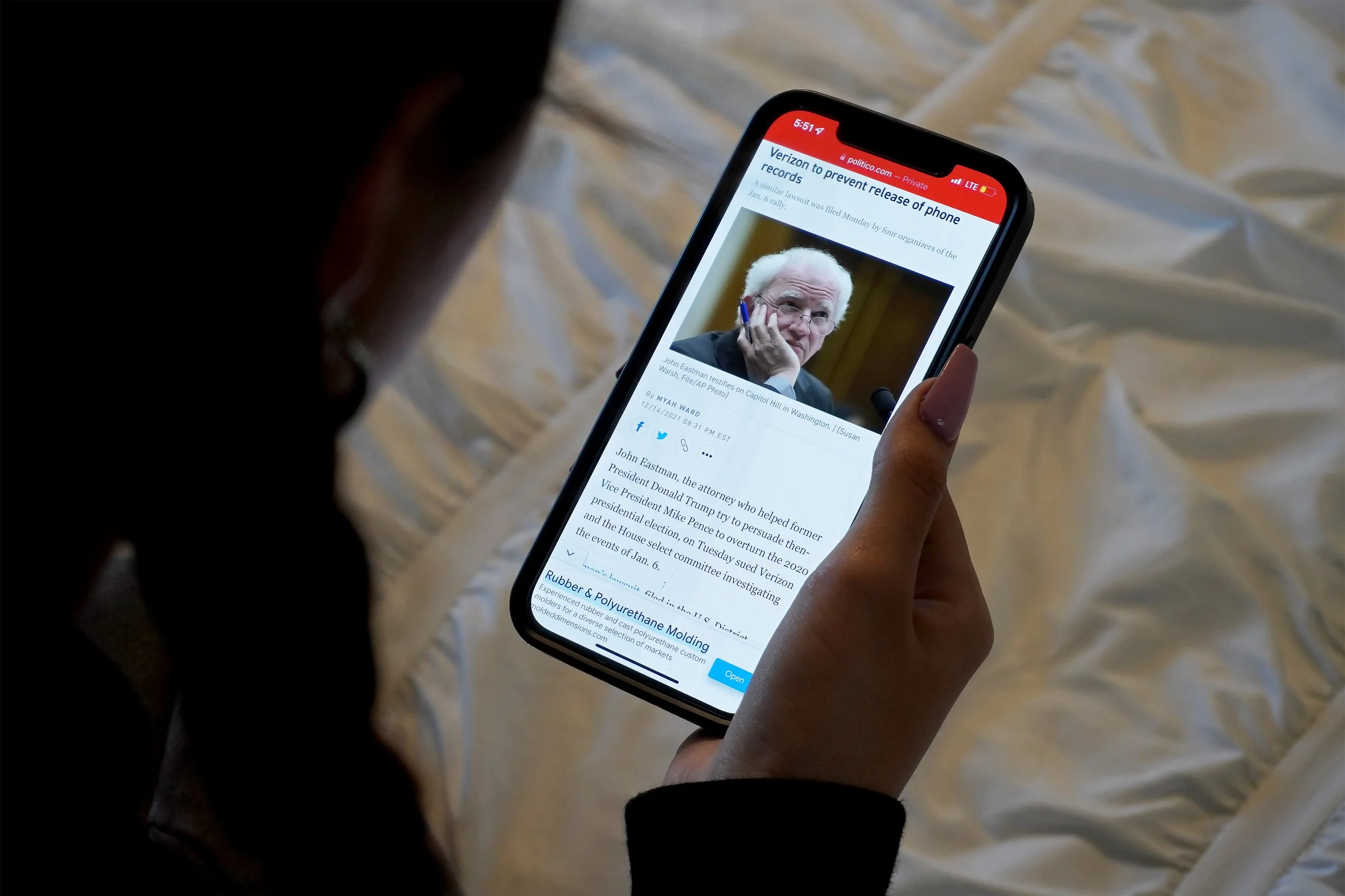Opinion | For Chapman, John Eastman is a canary in the coal mine
As further evidence comes to fruition of former Chapman law professor John Eastman’s involvement in the U.S. Capitol riots simultaneous to his university employment, Chapman has an opportunity for leadership. Photo illustration by EMILY PARIS, Staff Photographer
I’m sick of hearing about John Eastman.
I don’t mean The Panther’s fearless and thorough reporting of this unfolding story over the past year and a half, nor the open calls to action from faculty and students alike to the administration over its failure to respond. These actions of the community — those demanding more from our university — make me proud to say I go to Chapman.
What I am growing weary of, however, are the hushed whispers in the hallways, the subtle eye rolls, the veiled sarcasm that have become all-too-commonplace among faculty, students and staff in recent weeks. We are a community equal parts frustrated and exhausted by the continuing national coverage of the scandal involving the former Chapman professor, compounded exponentially by Chapman’s continuing silence.
Catherine Mysliwiec, senior communication studies major
Yet too often, we still speak of this controversy as a singular, sensationalized piece of gossip — not a harbinger gravely indicative of a much larger problem at our university.
There have always been “John Eastmans” in our national discourse — to put it as diplomatically as I can — and there always will be.
I do not expect anything from these figures.
Certainly, I will always believe in the responsibility of educated and informed citizens to protest, criticize and organize against the forces of stochastic terrorism, white nationalism and authoritarianism growing in our country.
But I’m not lying awake at night anticipating Eastman’s personal deus ex machina, or stroke of divine inspiration that will result in some miraculous change of conduct on his part.
There is an actor in this situation I do have expectations of, though: Chapman University.
Back in January 2021, I naively assumed the university would use the Eastman scandal to its advantage in some way — if only to define what Chapman unequivocally stands for and what it does not.
Frankly, as a new undergraduate transfer student, I was looking forward to this. I was excited to see my new alma mater publicly denounce Eastman, and — in doing so — the racism, extremism, disinformation, and political violence he had come to represent.
I was looking forward, out of this whole situation, to being proud of telling people I went to Chapman.
However, I’ve been disappointed to discover over the past two years that on the spectrum from “rule” to “exception” when it comes to Chapman’s faculty conduct, it’s not overtly clear to which side Eastman bends closer.
Don’t get me wrong: I’ve loved my time at Chapman. What’s made the last two years so exceptional has been the professors I’ve learned from — many of whom I’ve been fortunate enough to form relationships with beyond my courses. The opportunities to engage with and be mentored by such inspiring and accomplished scholars has, undoubtedly, been the best part of my Chapman experience.
Unfortunately, I've also experienced the opposite side of this coin: individuals who should, under no circumstance, be serving in any instructional role at this institution.
Coming into this university, I had a minimum expectation that I would be taught by a community of faculty members, who consistently — not “for the most part” or “generally-speaking” — but consistently embodied the highest levels of academic and personal integrity.
After one year of being on campus, I came to an even more disturbing realization: my experience was not unique.
My first year at Chapman was entirely remote, and I’ve also never lived on-campus. While I’ve certainly formed meaningful friendships this past year, I admit I’ve never felt entirely part of the community in the way I expected to.
Even as the "outsider," though, at least in the way I often see myself, I’ve been unnerved by the palpable student unrest with Chapman’s administration so consistently expressed across campus.
I’ve heard what is essentially the same story, reiterated again and again — across schools and departments — each revolving around the same foundational frustration: Chapman’s institutional decision-making when it comes to faculty and staff misconduct.
To put it gracefully, there appears to be a disconnect between the administration’s expectations of their faculty and those of the student body.
Obviously, this has created serious issues for Chapman, and the student frustration is visceral; you can feel it walking through campus.
My own experience this past year alone, compounded by the unsettling similarities I’ve found in the stories of other students, suggest a disturbing truth: Eastman doesn’t seem to have been an outlier at Chapman. It seems very possible, in fact, that he fit in quite well.
The catch, again, is that this problem has nothing to do with Eastman. He taught here from 1999–2021. He was a tenured faculty member and dean of Chapman’s Dale E. Fowler School of Law. He was nationally regarded as an expert in constitutional law.
Chapman does not have an Eastman problem; it has a Chapman one.
Accountability is the most foundational trait of leadership. It means, as leaders, we give up the option of making excuses for why anything that happens under us — the things we know about and the things we don’t — are anyone else’s fault.
Every single thing that happens at this university is a direct reflection of the leadership that is — or is not — taking place at its highest levels.
Furthermore, not knowing about an issue is not an excuse for not handling it. As the leader, your job is to go out and find the issues, then cut them off at their root before they grow into exponentially larger ones you’ll have to deal with eventually.
When an issue is brought to our attention, as leaders, we have a few jobs. The first is to handle the immediate crisis and its ongoing effects.
The second, however, is to commit ourselves, at all costs and under no pretenses, nor delusions of false pride, to find the answer to one question: how is this my fault? What am I, as the leader, doing — or not doing — that allowed this problem to happen?
What conditions is Chapman fostering — or passively enabling— that have resulted in an institutional climate where a faculty member like Eastman could be tenured, promoted to dean of the law school and teach for 22 years before anyone caught onto what are now such painfully obvious ethical deficiencies?
After answering these questions, then beginning the process of enacting the needed changes, the leader has one final task.
This is to go out into the community and find the other lingering branches of whatever we’ve discovered our root cause to be. This means searching relentlessly for the “John Eastmans” who are still being hired, granted tenure and promoted to senior positions within this university.
Perhaps one of these individuals will be the next disgraced faculty member to draw national headlines.
More likely, though, he or she is still roaming our campus, teaching, year after year — undetected by the administration while actively corroding the academic experience of Chapman’s students. This scenario should matter as much to the administration — if not more so — than the scandals which generate national publicity and ensuing condemnations.
People will eventually forget about Eastman. But the next time this happens at Chapman — the next “Eastman scandal” that makes local, state or national headlines, further gnawing at this University’s already depleted reputational reserves — will be unequivocally more damaging if we don’t address what is a painfully obvious and systemic issue now.
There isn’t shame in identifying and fixing problems, nor in taking ownership and responsibility for them; the latter, in fact, can engender respect. Chapman doesn’t need to be ashamed for uncovering what is clearly a glaring, systemic problem behind the “symptom” that is Eastman.
What Chapman should be ashamed of is failing to take any accountability for owning and addressing the Eastman issue, nor self-reflecting on its own structural deficiencies – in any meaningful way – as to how we got to this point in the first place.
A year and a half after the Jan. 6, 2021 U.S. Capitol riots, which Eastman is purported to have been responsible for planning, the administration continues — in sheepish silence — to put the entire onus of this problem on Eastman, hoping in vain that the community (and frankly, the entire nation) will eventually get tired of it and look away.
That’s not leadership.
What we need at Chapman is accountability. We need the administration to face this issue head-on, without passing the blame off to anyone else, and to earnestly correct the problem on a structural level to ensure that nothing like this happens at our university again. We need Chapman to unearth, then weed out, the source of this problem — root and branch.
That’s all any of us, as leaders or as people, can do. It’s all I ask of Chapman.
I want to feel pride in my university — to stand the slightest bit taller, not shrink those few inches lower — when I tell people I go here.
The path out of this nightmare will not be easy. Still, I believe it is possible and that there is still time. I also believe — as a current student and soon-to-be-alumnus of this university — that the effort will always — and unequivocally — be worth it.


